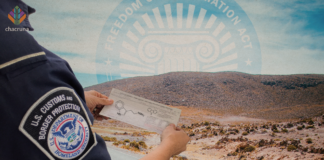Two Projects Seek to Change the Legal Status of Peyote and...
Mexico is currently debating ritual and traditional uses, as well as non-Indigenous and therapeutic uses of entheogens. During the past year, two legal reform proposals have been introduced to Mexico’s drug policy reform landscape. One of which is focused on the reclassification of psilocybin mushrooms and peyote, and the second is a request for legal consumption of the same sacred plants. This article describes the initiatives’ intentions, analyzes the proposals’ impact on the landscape for drug reform, and highlights the importance of a multicultural and human rights perspective, especially for the protection of Indigenous peoples’ rights.
Ayahuasca FOIA Requests Reveal Increased Ayahuasca Seizures, Lack of Due Process...
In February 2021, the Church of the Eagle and Condor (CEC) and the Chacruna Institute joined forces to initiate the “Ayahuasca Religious Freedom Initiative.” On March 16, 2021, lawyers for the CEC and Chacruna Institute filed Freedom of Information Act (“FOIA”) requests on U.S. Customs Border Patrol and the U.S. Drug Enforcement Agency. This article reviews the insights gained from the government’s disclosures, or lack thereof, to the Initiative’s public records requests.
DEA Denies Soul Quest’s Religious Exemption: Impacts on the Ayahuasca Community
For four years, Soul Quest and their lawyers petitioned for Religious Freedom Restoration Exemption against the DEA for interfering with ayahuasca ceremonies. On April 16, 2021, the DEA’s Diversion Control Division denied their petition to carry on its ayahuasca ceremonies legally. This article describes key takeaways on the DEA’s denial, the impacts for the larger ayahuasca community, and the road ahead.
Terminally Ill Patients Sue DEA for Psilocybin Treatment Under Right to...
“The Right to Try Act” gives patients with life-threatening diseases a way to access investigational drugs that are not yet approved by the FDA. The Advanced Integrative Medical Science Institute, a Seattle-based palliative care clinic, has partnered with a patient rights attorney to appeal the DEA to be able to provide psilocybin-assisted therapy for two of their patients with life-threatening diseases.
The Decriminalization of Marijuana in Brazil Beyond the Medicinal Use: Cannabis...
In recent times, there has been more advances in medical research on cannabis. Francisco Savoi de Arauja and Mauro Machado Chaiben demystify the modalities that go beyond the medical model. They primarily focus on the political need to decriminalize marijuana, and include references to the religious and social uses of marijuana by Rastafarian culture, Santo Daime religion, and “Cannabis Social Clubs.”
Controversies on the Environmental Legislation on Ayahuasca in Brazil
https://youtu.be/JKW9lIBrons
The religious use of ayahuasca has been the subject of drug policies in Brazil since 1985, when ayahuasca was temporarily banned for a period...
Open Letter to the Psychedelic Movement Regarding Peyote in Policy Efforts...
The Indigenous Peyote Conservation Communication Committee wrote a letter to the psychedelic community regarding the inclusion of Peyote in decriminalization measures. This letter provides context, history, and details about Native Americans’ relationship with Peyote, the Native American Church, and NAC’s conservation efforts, and also includes suggestions of how psychedelic and decriminalization movements can be an ally to Native American communities.
Oregon’s and Compass’s Opposite Approaches to Psilocybin Therapy Should Coexist, Says...
Marcelo Leite, Ph.D., summarizes how the medicalization and legalization regulatory models for psilocybin-assisted therapy can “naturally coexist within an integrated framework.” There are advantages and limitations to each model, and as investors begin to invest their attention on the emerging psychedelic therapies and research, it is important for all psychedelic organizations to work in tandem with each other’s framework as it will best serve the movement and public access for psilocybin-assisted therapy.
Fighting for the Legal Use of Ayahuasca as a Religious Sacrament...
Jasmine Virdi interviews Martha Hartney, an attorney fighting for the legal use of aya-huasca as a religious sacrament within the United States. In this article, Martha Hart-ney shares about the legal status of ayahuasca, how this intersects with the Religious Freedom Restoration Act (RFRA), and how we can collectively work towards securing the right to drink ayahuasca in bona fide religious settings.
Capitalism Goes Rogue with Patent Claims on Psychedelics
Not-for-profit organizations, like MAPS and Usona Institute, are just a few years away from completing FDA trials to medicalize psychedelic therapy. As psychedelic research gets closer to medicalization, for-profit companies, like COMPASS institute and ATAI Life Sciences, have filed patents about psilocybin, MDMA, and DMT. The author describes how for-profit’s patent claims and capitalism are impacting the psychedelic renaissance -- a movement with origins of psychedelic research in the 1960s, the summer of love, and healing for all.














